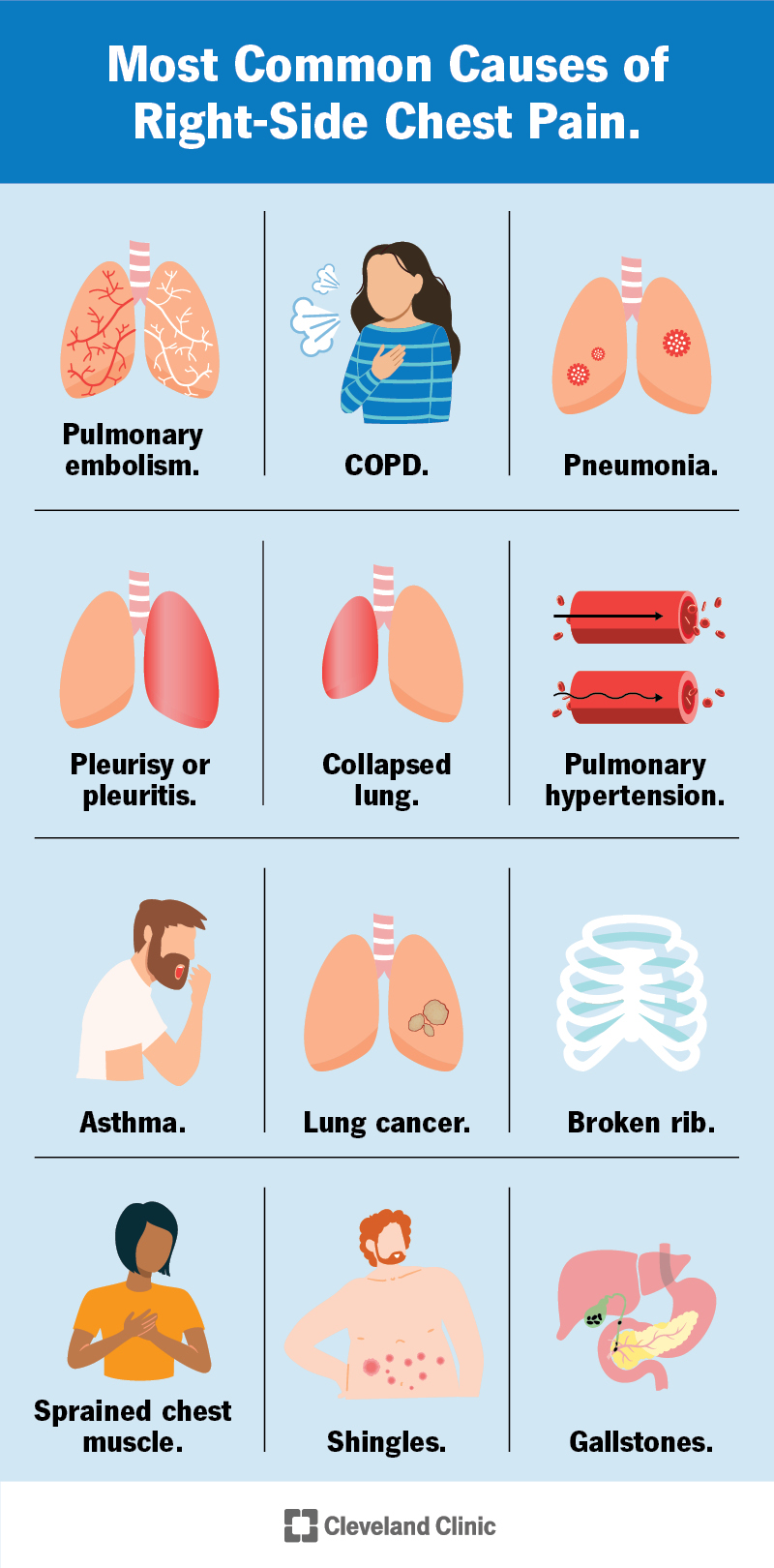Right-side chest pain has multiple causes, many of which involve your lungs. It may hurt more when you take a deep breath. You might feel sharp pain in some cases. Your healthcare provider can tell you what’s going on. Often, they can treat you with medication.
Advertisement
Cleveland Clinic is a non-profit academic medical center. Advertising on our site helps support our mission. We do not endorse non-Cleveland Clinic products or services. Policy

Image content: This image is available to view online.
View image online (https://my.clevelandclinic.org/-/scassets/images/org/health/articles/25070-right-side-chest-pain-cv)
Pain on the right side of your chest often happens because of an issue in your lungs. Right-side chest pain can be sharp. It can get worse when you inhale. You may have other symptoms along with right-side chest pain, like tightness or difficulty breathing.
Advertisement
Cleveland Clinic is a non-profit academic medical center. Advertising on our site helps support our mission. We do not endorse non-Cleveland Clinic products or services. Policy
Medicines help many causes of right-side chest pain. But some need treatment that includes a procedure.
Right-side chest pain can come from a number of issues in your lungs, muscles, bones or digestive system, to name a few. With many causes, you can’t get enough air in your lungs.
A blood clot from another part of your body can get stuck in a pulmonary artery inside your lung. People with a pulmonary embolism (PE) often describe sharp pain that worsens when they breathe in. You may have shortness of breath, too, or a fast/racing heart rate.
Issues with your air sacs and/or airway lining make it difficult for you to breathe. Your chest may feel tight and you may have shortness of breath and/or wheezing.
Sometimes, you can get an infection in your lungs. In addition to chest pain, you’ll also have a fever, chills and a cough with mucus.
An infection and/or inflammation of the membrane around your lungs gives you sharp chest pain. This kind of pain gets worse when you cough or breathe deeply. You may also have pain in your shoulder.
Air can get between the layers of a tissue that covers your lungs. This causes part or all of your lung to collapse. With no warning, you may feel a sharp pain in your chest and possibly your neck and shoulder.
Advertisement
Several disorders can cause high blood pressure in your pulmonary arteries. These are the blood vessels that take blood to your lungs to trade carbon dioxide for oxygen. You get chest pain because it’s harder for your heart to push blood through blood vessels when hypertension adds resistance to blood flow. You can have shortness of breath with this condition.
Allergens or irritants can narrow your airways, making it hard to breathe. You may cough or wheeze and feel tightness in your chest.
Chest pain from lung cancer gets worse when you cough, laugh or take a deep breath.
Accidents can break the ribs that protect your chest. This hurts a lot, especially when you breathe deeply. The pain lasts for several weeks.
When you injure your muscle, it can tear and cause pain, especially when you move. You may also have swelling and bruising.
The virus that gave you chickenpox as a child can become active again later, usually in people older than 50. As shingles, this virus causes a painful rash on your upper body. It usually develops in part of your chest, and typically only on one side.
With cholesterol as their main ingredient, gallstones can block ducts where a fluid (bile) that helps digestion needs to go to reach your small intestine. Swelling in your gallbladder causes pain under your ribs on your right side. This extreme pain can last for many hours.
Treatment will vary based on what’s causing your right-side chest pain.
Medicine helps many causes of right-side chest pain, like:
You may need a procedure or surgery for:
You may need radiation, surgery and chemotherapy for lung cancer.
You can’t treat most causes of right-side chest pain at home. You can treat a sprained muscle conservatively at home with heat packs. You should see a provider if it’s worsening or not getting better. After you see a healthcare provider, they can give you medicine to take at home.
The risk of not treating asthma, COPD and pulmonary embolism is that you may not get enough oxygen to your body’s organs and tissues. This can be life-threatening.
Without treatment, lung cancer is fatal.
It’s unlikely that you can prevent most causes of right-side chest pain. But there are some things you can do, like:
Advertisement
To prevent blood clots that cause a pulmonary embolism, you can:
You should seek treatment for any cause of right-side chest pain that lasts more than a few minutes.
Yes, you need immediate treatment for certain issues, like:
Chest pain on the right side can make you feel uneasy. In many cases, a lung issue is causing your pain. But your best bet is to have a healthcare provider check it out. That way, you can rest easy knowing they’ll figure out what’s going on and care for you. Once you have a diagnosis, be sure to follow your provider’s instructions and go to all your follow-up appointments.
Advertisement

Sign up for our Health Essentials emails for expert guidance on nutrition, fitness, sleep, skin care and more.
Learn more about the Health Library and our editorial process.
Cleveland Clinic’s health articles are based on evidence-backed information and review by medical professionals to ensure accuracy, reliability and up-to-date clinical standards.
Cleveland Clinic’s health articles are based on evidence-backed information and review by medical professionals to ensure accuracy, reliability and up-to-date clinical standards.
Need care fast? Cleveland Clinic’s Express Care and Urgent Care locations treat everything from sprains to sinus infections — no appointment needed.
